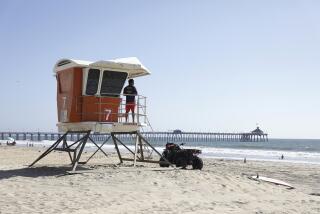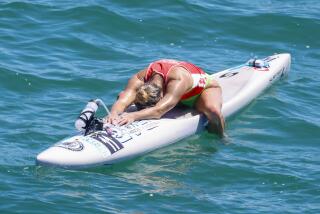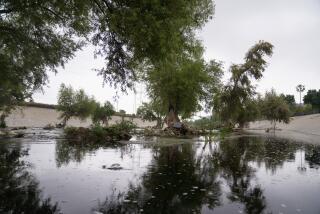HUNTINGTON BEACH : Clean Ocean Idea Peddled by Paddler
- Share via
Surrounded by the usual gaggle of surfers near the Huntington Beach Pier, 47-year-old Joel Fogel paddled his fluorescent orange kayak against the current toward the beach.
It was 10:40 a.m. Tuesday, and Fogel had been up for nearly five hours in another long day in his quest to measure water pollution from Seattle to San Diego.
The 1,300-mile voyage is expected to end Thursday in San Diego, where he will turn over 150 water samples collected along the way to the Scripps Institute of Oceanography for lab analysis.
The results, which will be available next week, should provide a snapshot of water conditions along the West Coast, Fogel said.
And they should provide support for instituting uniform testing of water quality along ocean shores in the United States.
“Right now, it’s anybody’s guess how often the states test . . . and what are the criteria,” said Fogel, a resident of Somers Point, N.J. Data such as Fogel is collecting will “point the finger” at states that are not doing adequate testing because they fear beach closings could scare away tourists, he added.
Fogel’s trip, expected to cost $5,000, is being sponsored by the Atlantic Audubon Society in Absecon, N.J., the Center for Marine Conservation in San Francisco and the Surfrider Foundation of Huntington Beach, Fogel said.
Last year, Fogel and 14 other kayakers did the same thing along the East Coast while they paddled the 2,000 miles from New York to Florida. Next year, he plans to organize a 3,000-mile voyage down the Missouri and Mississippi rivers from Montana to the Gulf of Mexico.
“The idea is to bring people’s attention to how important it is to protect our waterways,” Fogel said.
On this trip, the lone kayaker was accompanied by a volunteer who drove along the coast. Through radio communication, the driver meets Fogel to collect the water samples or give him a ride if weather conditions--such as thick fog--are impeding the trip.
Fogel first became concerned about ocean pollution in 1970, when fish began dying along the East Coast, he said. So he paddled by himself from New York City to Miami in 2 1/2 months to collect water samples for the Department of Interior.
“I felt there was something I had to do as an individual,” Fogel said.
He found raw sewage, harmful chemicals and dead sea animals in populated areas, he said. “I found that the ocean and the bays were cesspools. I was horrified.”
But last year, he found that conditions on the East Coast had improved because of an increasing awareness by authorities, resulting in efforts to keep the oceans clean.
After a press conference on the sand Tuesday, Fogel waded near the pier and scooped water into three vials--one to test for metals such as lead, the second for nutrients such as phosphate and the third for fecal waste.
More to Read
Sign up for Essential California
The most important California stories and recommendations in your inbox every morning.
You may occasionally receive promotional content from the Los Angeles Times.













